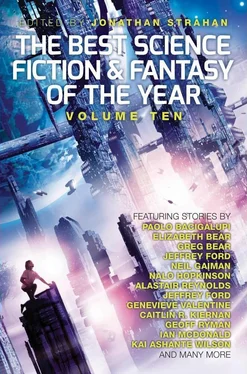“I don’t make noises through the wall. Neither am I going to tiptoe around my own flat.”
He took her home. When they were gone Dan and I went to the pub. We drank beer (Old Speckled Hen) and Dan said, “How many years do you think they left that poor cow stranded there, getting steadily more unhinged?”
“For all I know he’s round there every day looking after her.”
“You don’t really believe that.”
“Why not?” I looked at my watch. “He probably thinks it’s the best place for her. The house she grew up in.”
“You saw what she was like.”
“Old people know their own minds.”
“While they still have them.”
Back home, Dan went to bed, exhausted. I brought a spare duvet into the living room for myself, poured myself a whisky and settled down to watch the rest of Man With a Movie Camera . (Dziga Vertov, 1929.) When it was over I turned off the television and the lamp.
The hole in my wall was a neat oblong, black against the dim grey-orange of the wall. Though the handles had been removed, the door still had its mechanism. The pin still just about caught, holding the door shut against its frame. Already I was finding it hard to imagine the wall without that door.
I went into the kitchen and dug out an old knife, its point snapped off long before. I tried the knife in the hole where the handle had been and turned. Pinching my fingertips into the gap between the door and the frame, I pulled the door towards me.
The air beyond tasted thick, like wax. The smell – it had been lingering around my flat all day – was her smell. Fusty, and speaking of decay, it was, nevertheless, not unpleasant.
A red glow suffused the room. Light from a streetlamp easily penetrated the thin red material of her curtains; I could make out their outline very easily. The red-filtered light was enough that I could navigate around the room. It was stuffed full of furniture and the air was heavy with furniture wax. A chair was drawn up in front of a heavy sideboard, filling the space created by a bay window.
I ran my hand along the top of the sideboard. It was slick and clean and my hand came away smelling of resin. In her confusion, the old woman had still managed to keep her things spotless – unless someone had been coming and cleaning around her.
How many hours had she spent in this red, resined room? How many years?
I pulled the chair out of the way – its legs dragged on the thick rug – and opened a door of the sideboard.
It was filled with jars, and when I held one up to the red light coming through the curtains, the contents admitted one tawny, diagonal blear before resolving to black.
DAD WAS ALL for clearing out the lot. He had a van, his man could drive, they’d be in and out within the night. Such were the times, after all, and what great family is not founded on the adventures of a buccaneer?
But I had a youth’s hope, and told him no: that we should play the long game. I can’t imagine what I was thinking: that they would show some generosity to me, perhaps, for not stealing their property? Ridiculous.
Still, Dad let me have my head. Still, somehow, my gamble paid off. The landlord, whose family name was Franklin, hardly showered me with riches, but he turned out friendly enough, and the following spring, at his grandmother’s funeral, I met his daughters.
The match with Belinda – what a name! – was easy enough to arrange. The dowry would be a generous one. Pear orchards and plum trees, hops and brassicas and the young men to tend them. The whole business fell through, as I have said, but the friendship of our families held. When Dan ran into political trouble he gave up his career and came home to run things for Dad. It was to him Franklin gave his youngest child, my nephews’ mum. (Melissa. What a name.)
The rest is ordinary. Dan has run our estate successfully over the years, has taken mistresses and made some of them wives, and filled the house with sons. Of them, the two eldest are my special treasure, since I’ll have no kids myself. Every once in a while a brother of ours returns to take a hand in the making of our home. They bring us strange stories; of how the world is being set to rights. By a river in the Minas Gerais somewhere, someone has reinvented the dolphin. But it is orange, and it keeps sinking.
Poor Liam’s still languishing in Dubai, but the rest of us, piling in to exploit what we collectively know of the labour market, have done better than well.
As for me: well, what with one promotion and then another, this offshore London Britannia airfield has become my private empire. Three hundred observation drones. Fifty attack quadcopters. Six strike UAVs. There are eight thousand miles of coastline to protect, a hungry neighbour to the west famining on potatoes; to the east, a continent’s-worth of peckish privateers. It is a busy time.
Each spring we all pile back onto the estate, of course, to help with pollination. Tinkerers all. We experiment sometimes with boxes of mechanical bees, imported at swingeing cost from Shenzen or Macao. But nothing works as well as a chicken feather wielded by a practised hand. This is how Dan, the scion of our line, came to plummet from the topmost rung of his ladder. The sons he had been teaching screamed, and from where I sat, stirring drying pots on the kitchen table, the first thing that struck me was how they sounded just like girls.
DAD LEADS ME in. Much fuss is made of me. The boys vie with each other to tell their little brothers about the day, the airfield, the mayor. While Dad’s women are cooing over them, I go through to the yard.
Dan is sitting where he usually sits, on sunny days like these, in the shelter of the main greenhouse, with a view of our plum trees. They, more than any other crop, have made our family rich, and it occurs to me with a lurch, seeing my brother slumped there in his chair under rugs, that it is not the sight of their fruit that has him enthralled. He is watching the walls. He is watching the gate. He is guarding our trees. There’s a gun by his side. A shotgun. We only ever fill the cartridges with rock salt. But still.
Dan sees me and smiles and beckons me to the bench beside him. “It’s time,” he says.
I knew this was coming.
“I can’t pretend I can do this any more. Look at me. Look.”
I say what you have to say in these situations. Deep down, though, I can only assent. There’s a lump in my throat. “I haven’t earned this.”
But Dan and I, we have always been close, and who else should he turn to, in his pain and disability and growing weakness? Who else should he hand the business to?
The farm will be mine. Melissa. The boys. All of it mine. Everything I ever wanted, though it has never been my place to take a single pip. It is being given to me freely, now. A life. A family. As if I deserved it!
“Think of the line,” says Dan, against my words of protest. “The sons I’ll never have.”
We need sons, heaven knows. Young guns to hold our beachheads against the naughty French. Keepers to protect our crop from night-stealing London boys. Swords to fight the feuds that, quite as much a marriage pacts, shape our living in this hungry world.
It is no use. I have no head for politics. Try as I might, I cannot think of sons, but only of their making. Celia Johnson with a speck of grit in her eye. Underwear and a bed of dreams. May God forgive me, I am that depraved, my every thought is sex.
Dan laughs. He knows, and has always known, of my weakness. My interest in women. It is, for all the changes our world’s been through, still not an easy thing, for men to turn their backs on all the prospects a wife affords.
“Pick me a plum,” my brother says. So I go pick a plum. Men have been shot for less. With rock salt, yes. But still.
Читать дальше












